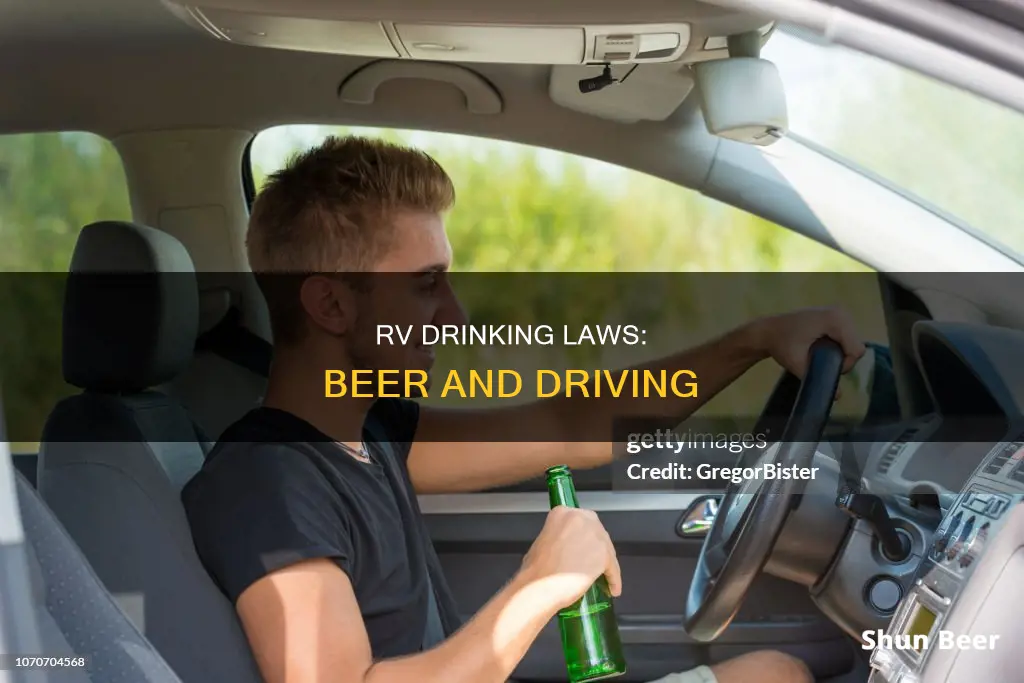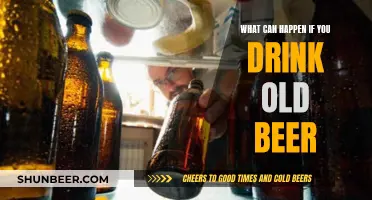
Drinking and driving is a criminal offence, and it is illegal to drink alcohol while driving an RV. However, the laws regarding passengers consuming alcohol in a moving RV vary from state to state in the US. While some states don't expressly forbid passengers from drinking in an RV, open container laws may apply. These laws prohibit the consumption of alcoholic beverages by those in moving vehicles, regardless of who is driving. In some states, passengers are permitted to drink alcohol in a moving RV if the vehicle is over a certain length. It is important to be aware of the laws in each state before consuming alcohol in an RV.
| Characteristics | Values |
|---|---|
| Drinking alcohol in a moving RV | Illegal in most states |
| Drinking alcohol in a stationary RV | Legal in most states |
| Open container laws | Prohibit the consumption of alcoholic beverages in moving vehicles |
| Exceptions to open container laws | Alaska, Connecticut, Delaware, Missouri, Rhode Island, Tennessee, Virginia, Arkansas, West Virginia |
| Drinking alcohol in the front seat of an RV | Illegal |
| Drinking alcohol as a passenger in an RV | Legal in some states |
| Drinking alcohol as a driver of an RV | Illegal in all states |
| RV size | Laws differ for RVs over 21 feet in length |
| State-specific laws | Florida, Louisiana, Texas, Wisconsin, Michigan, Ohio, California, Georgia, Indiana |
| Drinking alcohol in Canada | Regulated by the Canadian Border Service Agency (CBSA) |
What You'll Learn

Drinking alcohol in an RV is regulated differently from drinking at home
In the United States, open container laws regulate public drinking, with most states prohibiting alcohol consumption in public spaces except in designated areas. These laws also apply to passengers in moving vehicles, including RVs. While the driver of an RV cannot consume alcohol in any capacity while driving, the regulations for passengers are more nuanced and depend on the specific state and context.
In some states, such as Florida, Louisiana, and Texas, passengers are allowed to consume alcohol in the back living area of an RV while it is in motion, as long as the vehicle exceeds a certain length, typically 21 feet. However, other states, like Wisconsin, prohibit alcohol consumption by both the driver and passengers in any motorized vehicle, including RVs, regardless of its length.
It is important to note that even in states where alcohol consumption by passengers in an RV is technically legal, there may be caveats and risks. For example, in Virginia, passengers can drink in an RV, but if the vehicle is pulled over, police may presume that the driver was also drinking, leading to potential fines or jail time.
Additionally, local regulations in private campgrounds or public lands may further restrict alcohol consumption in RVs, even when they are stationary. Some counties or townships may also have "dry laws" that prohibit alcohol altogether within their boundaries.
Therefore, it is essential for RV passengers to be aware of the specific laws and regulations in the areas they are travelling through to avoid legal consequences. The safest option is often to refrain from drinking alcohol in an RV altogether and instead wait until the vehicle is parked and being used as a residence.
Beer and Prostate Surgery: What You Can Drink Post-Op
You may want to see also

Open container laws prohibit drinking in public, except in designated areas
Open container laws prohibit drinking in public places, except in designated areas. These laws are in place to prevent public intoxication and restrict the dangerous act of operating a vehicle while intoxicated. While the laws vary from state to state in the US, the majority prohibit possessing or consuming open containers of alcohol in public places.
Public places refer to openly public spaces such as sidewalks, parks, and vehicles. However, it is important to note that the definition of "public place" is not always clear and can vary across states. For example, in California, the law prohibits possessing open alcoholic beverage containers in public places owned by the city, county, or specific districts, but only in certain areas where local ordinances have been enacted.
Open container laws apply to all types of alcoholic beverages and are enforced in the passenger area of any motor vehicle, including unlocked glove compartments and other areas accessible to the driver or passengers. The laws cover all vehicle occupants, except for passengers in vehicles designed for transportation for pay, such as taxis, and the living quarters of motor homes, campers, or recreational vehicles.
To be considered "open," a container typically has a broken seal, a missing cap, or some contents removed. While open container laws generally prohibit drinking in public, there are exceptions and designated areas where drinking is permitted. For instance, some states allow open containers during special events or in certain districts, such as downtown areas or tourist spots. Additionally, private campgrounds, which are usually privately owned, may have their own rules regarding alcohol consumption.
It is important to note that open container laws do not apply when an RV is parked and being used as a domicile. In this case, the vehicle is considered a residence, and occupants are free to consume alcohol within the boundaries of normal intoxication laws. However, when it comes to drinking in a moving RV, the laws vary by state, and it is essential to verify the regulations in each state before embarking on a trip.
Shout Stain Remover: Beer Stain Solution?
You may want to see also

Some states have stricter open container laws than others
Open container laws apply to motorhomes when they are being used as a vehicle and transporting people. These laws vary from state to state, with some states having stricter rules than others.
In most states, open container laws apply to all moving RVs, regardless of their size, with the exception of vehicles over 21 feet in length. Florida and Louisiana are examples of states with this exception. In these states, passengers are allowed to consume alcohol in the back living area of an RV that is over 21 feet in length. However, it is important to note that even in these states, the open container cannot be within reach of the driver.
Some states have stricter open container laws, with a complete ban on open containers in the vehicle's passenger area. For example, South Carolina does not have an exception clause in its statutes, and Wisconsin prohibits alcohol consumption by both passengers and drivers in any RV, regardless of its length.
Additionally, certain states have unique circumstances that further complicate open container laws. For instance, in Ohio, the only vehicle in which a passenger can legally drink alcohol is a chauffeured limousine. In Texas, a driver can be cited for an open container violation if someone else is drinking while parked on the side of the road.
It is essential to be aware of the specific open container laws in each state before travelling, as penalties for violations can vary widely and may include fines, jail time, or loss of driving privileges.
Mixing Beer and Wine: What's the Harm?
You may want to see also

Passengers can drink in a moving RV in some states
Drinking alcohol in a moving RV is prohibited in most states. However, some states have exceptions to this rule, allowing passengers to consume alcohol while the vehicle is in motion.
In Florida and Louisiana, passengers are permitted to drink in the back living area of an RV, provided it is at least 21 feet in length. This exception also applies to other states, such as Michigan, but only for RVs exceeding 21 feet in length.
In Texas, passengers can drink in the living quarters of an RV, regardless of its size. However, in Wisconsin, open containers are prohibited in any motorized vehicle, including RVs.
Some states, like Arkansas and West Virginia, allow passengers to possess an open container but not to consume alcohol while the RV is in motion.
It is important to note that even in states with permissive laws, passengers should be cautious. For example, in Virginia, passengers drinking in an RV may result in police presuming the driver was also drinking, leading to potential fines or jail time.
Overall, the laws regarding alcohol consumption in moving RVs vary across states, and it is essential to check the regulations in each state before embarking on a journey.
The Magic Behind Beer Engines: How Do They Work?
You may want to see also

Drinking and driving is a criminal offence
In the US, 40 states and Washington D.C. forbid the possession and consumption of open alcoholic beverages in a motor vehicle. In these states, it does not matter whether you are a passenger or the driver—it is illegal either way. However, some states, such as Texas, do not consider you in violation of any open container laws as long as you are in the living quarters of your camper, RV, or motorhome. Other states, such as Florida and Louisiana, specify that if the RV is in motion, you must be sitting in the back of an RV that is at least 21 feet long. This means you must be nowhere near the driver while consuming alcohol.
Even if you are within the law, drinking and driving is incredibly dangerous. RVs are already difficult to control, even when the driver is sober. They are larger vehicles that can be harder to manoeuvre than standard cars and trucks, and they have more blind spots. They are also much heavier, making them hard to stop quickly to prevent crashes and collisions. Once you lose control when behind the wheel of an RV, it can be virtually impossible to recover from it. This increases the risk that your RV will flip because you run off the road, even for a single second.
So, while it may be legal to drink as a passenger in an RV in some states, it is always best to refrain from drinking alcohol altogether when on the road. Wait until you are parked for the night to crack open a cold one.
Beer Tastes Better After a Good Workout: Why?
You may want to see also
Frequently asked questions
No, it is illegal to drink beer in a moving RV in most states.
Open container laws are state laws that regulate public drinking and prohibit the consumption of alcohol in public, except in designated areas.
Some cities and counties within the United States, like Clark County, Nevada, permit public drinking with a few exceptions. Additionally, public drinking is permitted throughout the state of Indiana.
Open container laws prohibit the consumption of alcoholic beverages by those in moving vehicles, regardless of who is driving. However, if the RV is parked, open container laws do not apply.
Violating open container laws can result in expensive tickets, fines of $100 or more, or even possible jail time in some states.







